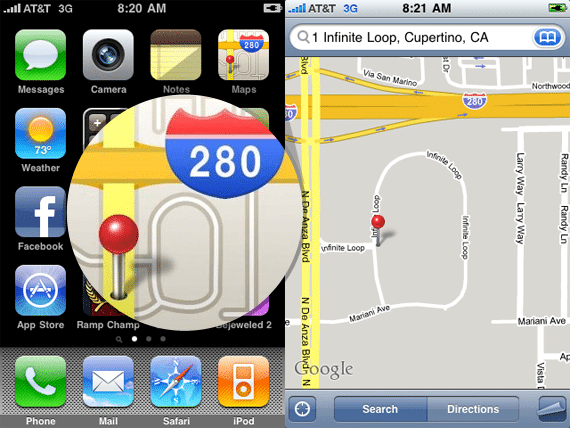Whilst the dust settles around Apple’s new Map service, (when the Eiffel Tower returns to Paris, Stratford-upon-Avon exists again and the Mars rover discovers it’s no longer in Norway), one thing will be clear, Apple is not about to let Google own the Augmented Reality market.
Apple sees where the mobile market is heading, just as they foresaw and initiated the rise of tablets. Google already wield an insurmountable influence over the Internet, with 85% of the search engine market share, and they are already in a similar position to wield the same amount of power over AR. Apple are no longer keen to play second fiddle – as they did throughout most of the 90s and early 00s – they have made this haphazard launch into the Maps and methinks eventually the AR arena.
It’s easy to overlook just how important and ubiquitous Google Maps has become; most of us no longer fear making our way to new places and destinations. We now stop people mid-sentence demanding a postcode or street name. While tech-bloggers, and their ilk, continue to rant and rave over predictable exponential growth of processors, resolutions and screen size, the understated and just as ubiquitous GPS has also been overlooked. The true potential of the GPS is only just about to come into its own, with the help of augmented reality.
Why are Maps so important to Augmented Reality?
The future of AR is underpinned on the evolution of GPS, Maps and gyroscope technology (that’s the ability to sense which way you are facing). All of these technologies currently sit in the latest mobile phones, working in synergy to get you from point A to B. The next stage in their evolution will focus these components into a pair of glasses, or some other shiny gadgetesque device that we all will drool over. The fundamental key here is maps; none of these components interact with the user as effectively, on any other mainstream software platform, as they currently do in Google Maps. Something many iPhone 5 and iOS 6 users have found out recently.
Apple has plenty of time to build up its Map system before the dawn of AR, and I believe it’s going to be one of its highest priorities over the next few years. Will they produce their own version of Google Glass? Probably, but Google has a huge head start in the Augmented Reality game.
Google Places currently dominate as a business directory, making other types of web directory services almost irrelevant. It’s here where AR and business will merge. Places is already set up to provide business information such as restaurant menus, opening times and so on. It’s only logical that Google then implements augmented reality features into your Places page, making menus and opening times interactive to whoever walks by with an AR device. This unified system of GPS, Maps and Places will underpin Google Glass, it will be up to Apple to form its own stand-alone system to compete.
A fascinating but perhaps overreaching vision of the future of AR.
Sight from Robot Genius on Vimeo
Glimpses of AR have already materialized as recently as a few years ago with an App called Layar. The idea was that you could point your mobile device to a venue, where it would pull up business information such as opening times and menus. Like with a lot of technology timing is critical and unfortunately, it was not theirs, but the seed had been planted. Google Glass and other AR devices will, at first, operate in the same way.
“Foursquare championed this concept”
AR has huge potential, it’s already priming itself to integrate with social media, Google+, Facebook and Twitter. Looking at someone with an AR device would prompt a social media tab to open up displaying their profile information; only if it’s made public of course. Looking even further ahead you can imagine Game Dynamics being applied to AR, turning mundane tasks into game scenarios for example, getting the fastest time on your route to work would gain points. Foursquare championed this concept, and like social media, it’s just as primed for AR.
At the end of the day, Google has a massive head start, but it will be interesting to see where the pieces fall, and who comes out on top. In the battle for tech supremacy, one thing is for sure, Augmented Reality will be one of the next big battles.
The future is Augmented.
Posted by: Jean Paldan
Sep 28, 2012


